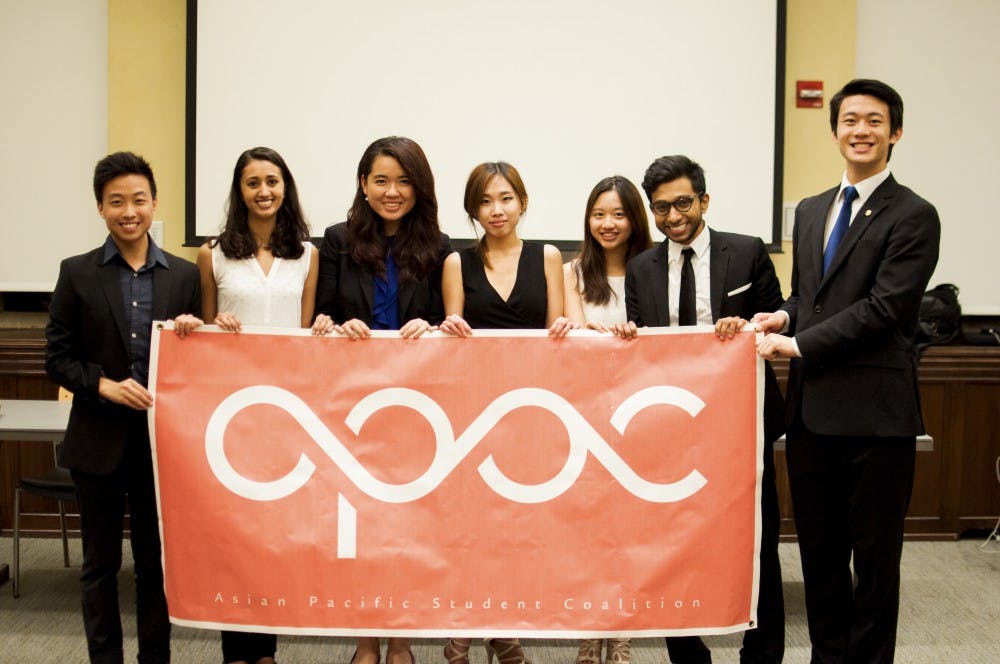
After failing to be guaranteed a seat on the University Council, the Asian Pacific Student Coalition is pushing for increased representation for minority groups. | Courtesy of Jin Kim
Five minority groups, including the Asian Pacific Student Coalition, currently have a seat on the University Council. But APSC has not been guaranteed a spot for the upcoming year.
The five groups are the Latino Student Coalition, UMOJA, which encompasses student groups of the African Diaspora, the United Minorities Council, the Asian Pacific Student Coalition and the Lambda Alliance — known informally as the “5B.”
In the latest round of elections, the Nominations and Elections Committee voted to fill nine of the 15 seats that are reserved for student groups. Three of the six remaining seats are designated for the Undergraduate Assembly President, Vice President and Speaker, and the final three seats, known as “flex seats,” are up for grabs as soon as the NEC and UA elect their new boards, which then vote on who will fill the flex seats. Sometimes these seats are decided by the end of the spring semester, but sometimes it takes until the beginning of fall.
Either way, APSC is now pushing to be guaranteed one of them.
But for now, APSC chair and College junior Sarah Cho said the lack of representation among the nine regular student groups is problematic.
“This adds to several prominent Asian-American issues that are on campus and nationwide: the problem of visibility, the problem of the ‘model minority,’ the fact that our issues aren’t heard,” she said. “It’s allowing more serious problems of discrimination and prejudice to fester right under all of our noses.”
This has happened before. During University Council seat elections in 2011, APSC was also denied a seat, and this time board members of the group are hoping to make a lasting change to prevent it from happening again. Cho said the group is not only pushing for their own seat, but also for an increase in the total number of seats available for student groups. That way, groups like Penn First, which represents Penn’s first-generation college students and will replace APSC, can also keep their seat.
“We strongly support the fact that [Penn First] has a seat. We believe that they should have a seat, and when it comes down to it, that’s why we want more seats,” vice chair of Political Affairs and Wharton sophomore Yen-Yen Gao said.
In APSC’s change.org petition, a guaranteed flex seat is the first demand. Second is the increase in University Council seats for underrepresented and misrepresented organizations. Finally, they also call for permanent seats for the 5B and Penn Association for Gender Equity.
Wharton senior and chair of NEC Michael Roberts said twice as many groups applied as the NEC had seats to give.
“These decisions become more and more difficult,” he said.
To make decisions, the committee uses 10 criteria, which are publicly available on their website. Of the 10 criteria, only one addresses “whether and how the constituency is mis- or underrepresented.” Other criteria address things like the “relevancy of the constituency for upcoming things on the agenda of the University Council,” Roberts said.
Cho said she doesn’t think the NEC realizes how relevant Asian American students’ concerns are, citing how the Vietnamese Student Association was heckled at Spring Fling last year.
“People yelled racial slurs at them,” she said. “These issues aren’t necessarily at the forefront of everyone’s mind, and they clearly weren’t at the forefront of the NEC’s mind when they made this decision.”
Roberts said there has been a precedent for adding University Council seats for student groups, but only because the UA used to have more seats, and they switched some of them over for determination by the NEC. The total number of student seats can’t be changed by the NEC or the UA.
“It’s written into [The University Council’s] bylaws how many undergraduate seats there are,” he said. “They would need to change their own bylaws.”
Roberts said it would make the NEC’s life easier as well if seats were added.
“We would love if there were more seats,” Roberts said. “The NEC would love to be a part of that discussion.”
The Daily Pennsylvanian is an independent, student-run newspaper. Please consider making a donation to support the coverage that shapes the University. Your generosity ensures a future of strong journalism at Penn.
DonatePlease note All comments are eligible for publication in The Daily Pennsylvanian.








